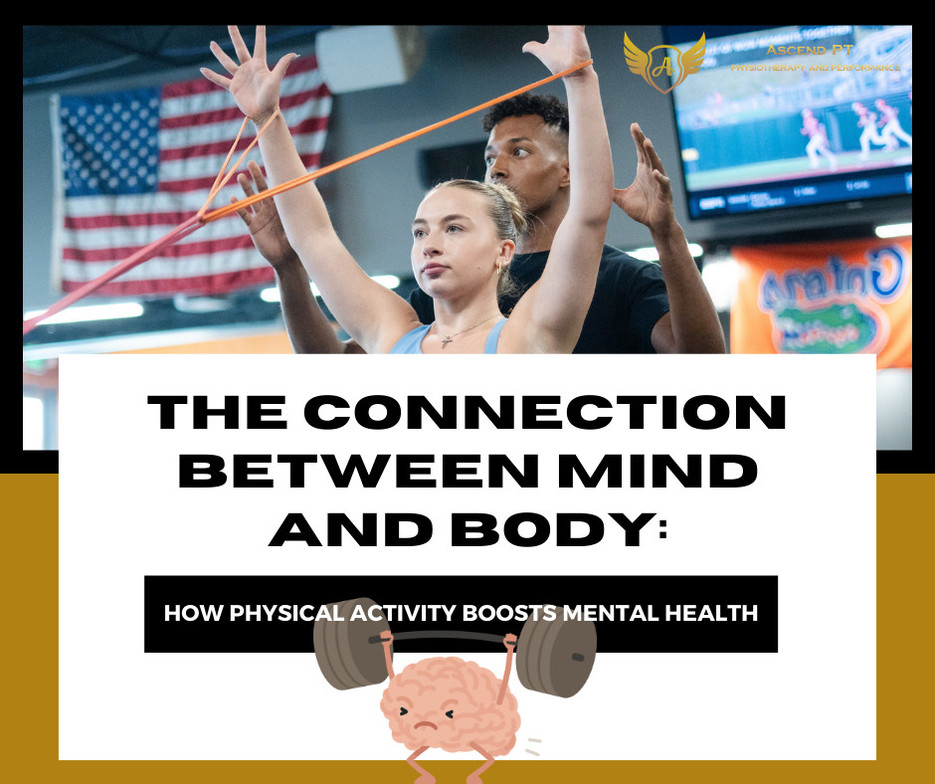
INTRODUCTION
In our fast-paced world, the importance of mental health is becoming increasingly recognized. Many of us are aware of the traditional methods for managing mental health, such as therapy or medication, but there is a powerful, often overlooked tool that can significantly enhance mental well-being: physical activity. At Ascend PT Physiotherapy and Performance, we understand that the connection between mind and body is profound. Regular exercise not only strengthens the body but also plays a crucial role in boosting mental health. This blog will explore how physical activity impacts mental well-being, including its benefits for reducing anxiety, depression, and stress, and provide practical tips on how to incorporate exercise into your daily routine.
1. Understanding the Mind-Body Connection
The Science Behind Exercise and Mental Health
- Neurotransmitter Release: Physical activity triggers the release of neurotransmitters such as endorphins, serotonin, and dopamine. These chemicals play a significant role in regulating mood and reducing feelings of anxiety and depression.
- Stress Hormone Reduction: Exercise lowers the levels of stress hormones like cortisol. Reduced cortisol levels can help alleviate feelings of stress and contribute to a calmer mental state.
- Brain Function Enhancement: Regular exercise promotes neurogenesis, the growth of new brain cells, and improves overall brain function. This can lead to enhanced cognitive function, better memory, and increased mental clarity.
The Impact of Physical Activity on Mental Health
- Reduction in Anxiety: Exercise helps reduce anxiety by promoting relaxation and boosting mood. Physical activity increases the production of endorphins, which act as natural painkillers and mood enhancers.
- Alleviation of Depression: Regular physical activity has been shown to reduce symptoms of depression. Exercise stimulates the production of brain chemicals that improve mood and provide a sense of well-being.
- Stress Management: Engaging in physical activity can help manage and reduce stress. Exercise provides a constructive outlet for releasing tension and improves overall stress resilience.
2. How Physical Activity Reduces Anxiety
Mechanisms of Anxiety Reduction
- Endorphin Release: Physical activity stimulates the production of endorphins, which help alleviate anxiety and promote a feeling of happiness.
- Distraction and Engagement: Exercise provides a healthy distraction from daily worries and negative thought patterns, helping to refocus the mind.
- Physical Relaxation: Activities such as yoga and stretching help relax the body and mind, reducing physical symptoms of anxiety like muscle tension and restlessness.
Effective Exercises for Anxiety Reduction
- Aerobic Exercise: Activities such as running, cycling, and swimming can be particularly effective in reducing anxiety due to their intense cardiovascular benefits.
- Mind-Body Practices: Yoga, tai chi, and Pilates combine physical movement with mindfulness, which can be especially beneficial for managing anxiety.
3. How Physical Activity Alleviates Depression
Mechanisms of Depression Alleviation
- Serotonin Production: Exercise increases the production of serotonin, a neurotransmitter that regulates mood, sleep, and appetite. Higher serotonin levels are associated with improved mood and reduced symptoms of depression.
- Cognitive Function: Physical activity enhances cognitive function and executive function, which can be impaired in individuals with depression. Improved cognitive function contributes to better problem-solving and emotional regulation.
- Social Interaction: Group exercises and fitness classes offer social interaction, which can provide support and reduce feelings of isolation often associated with depression.
Recommended Activities for Depression Relief
- Strength Training: Resistance exercises such as weightlifting or bodyweight exercises can improve mood and build self-esteem by enhancing physical strength and fitness.
- Outdoor Activities: Engaging in outdoor exercises, like hiking or walking in nature, can further boost mood by combining physical activity with the mental benefits of being in natural environments.
4. How Physical Activity Helps Manage Stress
Mechanisms of Stress Management
- Cortisol Reduction: Regular physical activity helps lower cortisol levels, the hormone associated with stress. Reduced cortisol levels contribute to a more relaxed and balanced state.
- Improved Sleep: Exercise promotes better sleep quality, which is crucial for stress management. Adequate sleep helps the body and mind recover from daily stressors.
- Increased Resilience: Engaging in regular exercise enhances overall resilience to stress by improving physical fitness and mental toughness.
Stress-Relief Exercises
- Cardiovascular Workouts: Activities like running, swimming, or cycling increase heart rate and stimulate the release of endorphins, which help combat stress.
- Relaxation Techniques: Incorporate practices such as deep breathing exercises or progressive muscle relaxation into your workout routine to enhance stress relief.
5. Getting Started with a New Fitness Routine
Setting Realistic Goals
- Start Small: Begin with manageable goals that fit into your current lifestyle. For example, aim for 15-20 minutes of exercise a day and gradually increase as you build stamina.
- Consistency is Key: Establish a regular exercise routine to maximize the mental health benefits of physical activity. Consistency helps create lasting habits and long-term improvements in mental well-being.
Choosing the Right Activities
- Find What You Enjoy: Choose activities that you enjoy and look forward to. Enjoyable activities are more likely to become a regular part of your routine.
- Mix It Up: Incorporate a variety of exercises to keep your routine interesting and address different aspects of fitness. Combining cardiovascular, strength, and flexibility exercises can provide comprehensive benefits.
Creating a Supportive Environment
- Exercise with a Friend: Engage in physical activities with a friend or join a group exercise class. Social support can enhance motivation and make exercise more enjoyable.
- Track Your Progress: Use a fitness app or journal to track your workouts and monitor improvements. Tracking progress can provide motivation and a sense of accomplishment.
CONCLUSION
The connection between physical activity and mental health is powerful and transformative. Regular exercise not only strengthens the body but also significantly boosts mental well-being by reducing anxiety, alleviating depression, and managing stress. At Ascend PT Physiotherapy and Performance, we are dedicated to supporting your journey towards better mental and physical health. Embrace the benefits of physical activity, set achievable goals, and incorporate exercise into your daily routine to enhance your overall quality of life. If you’re ready to start your journey to improved mental health through physical activity, contact us today to explore how our personalized programs can help you achieve your goals.
Dr. Alex Samuel
Contact Me

